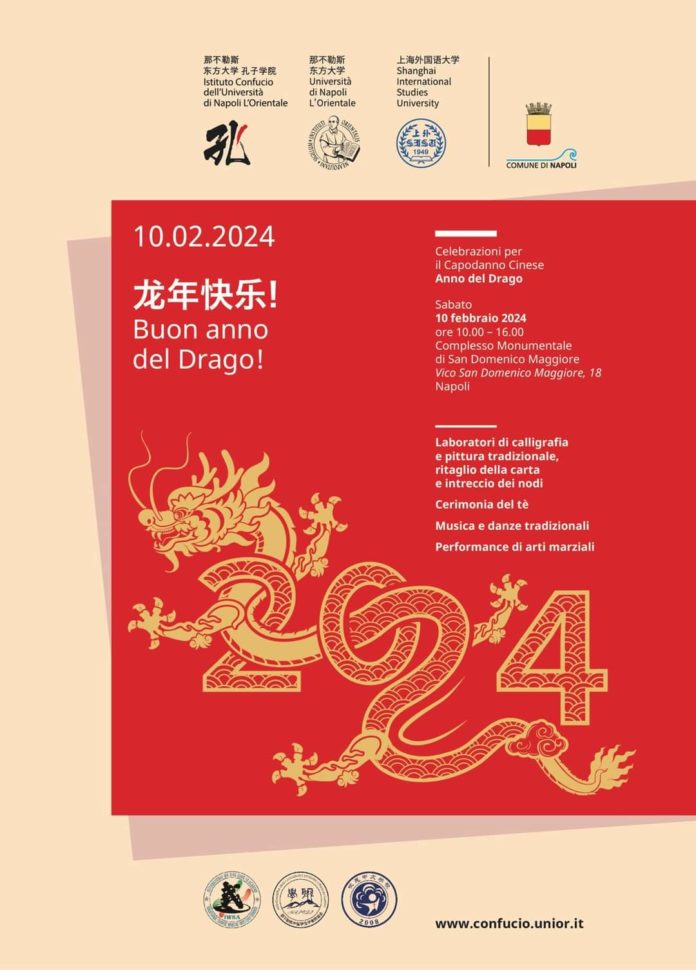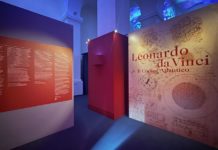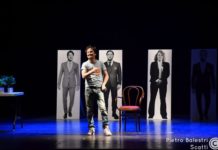Il complesso monumentale di San Domenico Maggiore di Napoli ospita il Capodanno cinese. Sabato 10 febbraio, dalle 10 alle 16, l’Istituto Confucio dell’Università di Napoli L’Orientale apre le celebrazioni del nuovo anno cinese.
L’anno del Drago, simbolo di buon auspicio associato al concetto di yang che rappresenta il bene e l’acqua, viene festeggiato tra laboratori, musiche, danze, arti marziali. Durante la giornata saranno diversi i laboratori, curati dei docenti dell’Istituto Confucio, proposti per avvicinarsi alle espressioni artistiche tipiche della cultura cinese: dalla calligrafia alla pittura, all’intaglio in carta, all’arte delle lanterne e dei nodi cinesi, alla cerimonia del tè.
Cuore della festa sarà la danza del Drago che, alle 13, si aggirerà tra la piazza e il complesso monumentale di San Domenico. Le esibizioni saranno a cura dell’International Wu Xing Kung Fu Academy.
Spiega Valeria Varriano, direttrice dell’Istituto Confucio di Napoli: « La notte di Luna nuova dopo il solstizio d’inverno è una delle più cupe e ha per lungo tempo spaventato gli uomini. Molte feste tradizionali sono nate proprio per scacciare quei mostri che il buio e il freddo evocavano. La festa di Capodanno o Festa della Primavera che apre al nuovo anno in Cina ma anche in buona parte dell’Asia Orientale, è una di queste. L’Istituto Confucio dell’Università di Napoli l’Orientale ha deciso di festeggiarla, nella sede del Complesso monumentale di San Domenico Maggiore, con turisti e cittadini napoletani che saranno accolti da musiche, danze ed attività laboratoriali dove, grandi e piccini, potranno conoscere piccole e grandi arti come la realizzazione dei nodi cinesi. L’auspicio è che tutti insieme, ascoltando i canti dei giovani studenti italiani e cinesi, godendo della danza del drago e cimentandosi in arti poco familiari, potremo illuminare l’anno del Drago che sta per iniziare conoscendosi un po’ meglio».
San Domenico Maggiore/ Chinese new year under the sign of the dragon. Between lantern art and tea ceremony
The monumental complex of San Domenico Maggiore in Naples is hosting the Chinese New Year. On Saturday, February 10th, from 10 a.m. to 4 p.m., the Confucius Institute of the University of Naples L’Orientale opens the celebration of the Chinese New Year.
The year of the dragon, an auspicious symbol associated with the concept of yang representing good and water, is celebrated among workshops, music, dances and martial arts. During the day there will be several workshops, curated by Confucius Institute teachers, offered to get closer to the typical artistic expressions of Chinese culture: from calligraphy to painting, paper carving, the art of Chinese lanterns and knots, and the tea ceremony.
The heart of the festival will be the dragon dance, which, at 1 p.m., will wander between the square and the San Domenico monument complex. Performances will be by the International Wu Xing Kung Fu Academy.
Valeria Varriano, director of the Confucius Institute in Naples, explains, “The night of the new moon after the winter solstice is one of the darkest and has long frightened people. Many traditional festivals were born precisely to drive away the monsters that darkness and cold bring. The New Year or Spring Festival, which marks the beginning of the New Year in China and much of East Asia, is one of them. The Confucius Institute of the University of Naples l’Orientale has decided to celebrate it in the Monumental Complex of San Domenico Maggiore, with tourists and Neapolitans who will be welcomed by music, dances and workshops where young and old can learn small and big arts such as Chinese knot tying. It is hoped that all together, listening to the songs of the young Italian and Chinese students, enjoying the dragon dance and trying our hands at unfamiliar arts, we will be able to brighten the year of the dragon, which is about to begin, by getting to know each other a little better”.










